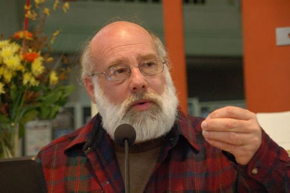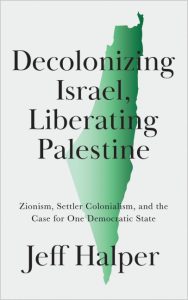By Joe Burns, Commission Member
 Jeff Halper, a Jewish academic living in Jerusalem, is the chair of ICAHD (Israeli Committee against House Demolitions). As part of a speaking tour in England he spoke at the St George’s Conference Centre in Leeds in early September. Over 50 people turned out for a talk by this very engaging speaker. What he had to say was not without controversy – not least because it turns upside down the conventional wisdom of the last 30 years about Israel Palestine!
Jeff Halper, a Jewish academic living in Jerusalem, is the chair of ICAHD (Israeli Committee against House Demolitions). As part of a speaking tour in England he spoke at the St George’s Conference Centre in Leeds in early September. Over 50 people turned out for a talk by this very engaging speaker. What he had to say was not without controversy – not least because it turns upside down the conventional wisdom of the last 30 years about Israel Palestine!
His basic position can be described as follows:
The “Palestinian-Israeli conflict” has often been presented as one of the most intractable in modern world history. But Jeff Halper’s first point is that this is not a conflict. There are not two sides fighting over some issue that can be resolved through technical negotiations and compromise. Rather, Zionism was – and is – a settler-colonial project.
Jewish settlers arrived in Palestine from Europe with the intention of taking over the country and making it their own. Like all settler movements they came equipped with a narrative of why the country actually belonged to them, and they pursued their claim to entitlement unilaterally. The indigenous Palestinian population (which included Sephardi, Mizrahi and ultra-Orthodox Jews) had no voice in the process; they were not a “side,” but simply a population to be disposed of.
Palestinians are now confined to disconnected and impoverished enclaves scattered over 15 percent of their country. The unequal treatment of Jews and Arabs enshrined within Israeli legislation lead Jeff to label Israel as an ‘apartheid state’.
Settler-colonialism and apartheid, however, cannot be resolved through negotiations and compromise. A people cannot negotiate their fundamental human, national, political and civil rights. The only way out of a colonial situation is through a process of decolonization.
What does that entail? It entails a fundamental readjustment to the current reality. It entails the return of Palestinian refugees and their reintegration into society. It entails the dismantling of all structures of domination and control, be they political, economic or ideological and cultural.
It requires acknowledging that the colonized population has the right to an equal say in the construction of the post-colonial polity. It necessitates the formation of a new political system and civil society that guarantees equal rights to all its citizens as well as to the national, ethnic and religious groups that comprise it.
It further demands an equitable redistribution of resources, especially land, the prime target of settler-colonialism, along with an acknowledgment by the colonizers of the suffering they have brought, and consequent reparations.
It is such fundamental change that is needed to generate a new, shared political community. And that, in turn, is the only possible way settler-colonialism can be transcended.
 At the end of his presentation many people wanted to ask questions – as you probably do if you have got this far. Jeff would be the first to admit that the idea is still relatively new and needs more working out. Nevertheless, he built a very persuasive argument for taking this approach and if you are curious as to how this might be more than ‘pie in the sky’ thinking then I would recommend you to read his book about it: “Decolonizing Israel, Liberating Palestine” (2021) where he sets out in detail the case for viewing the situation in this way and a political vision of the practical measures that could actually bring it about.
At the end of his presentation many people wanted to ask questions – as you probably do if you have got this far. Jeff would be the first to admit that the idea is still relatively new and needs more working out. Nevertheless, he built a very persuasive argument for taking this approach and if you are curious as to how this might be more than ‘pie in the sky’ thinking then I would recommend you to read his book about it: “Decolonizing Israel, Liberating Palestine” (2021) where he sets out in detail the case for viewing the situation in this way and a political vision of the practical measures that could actually bring it about.
